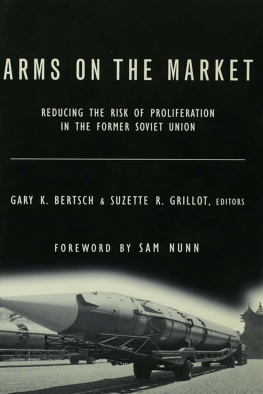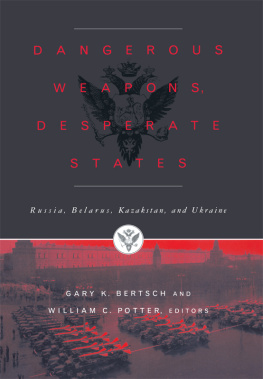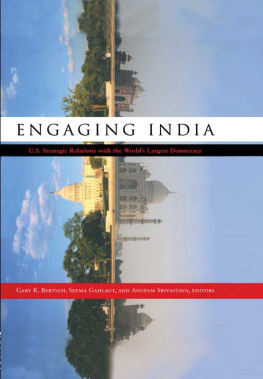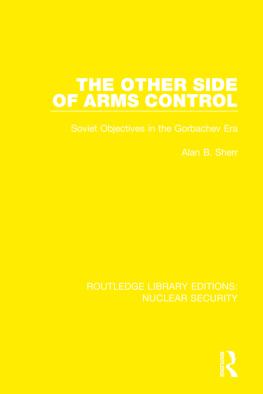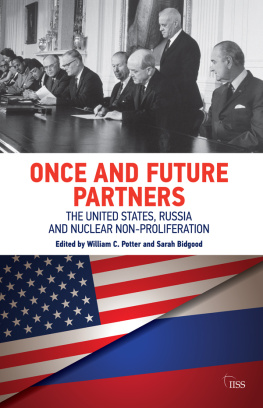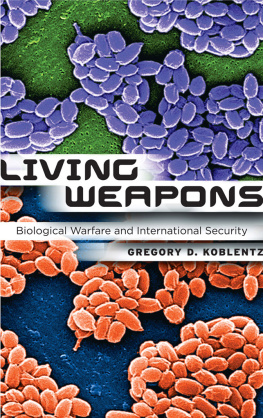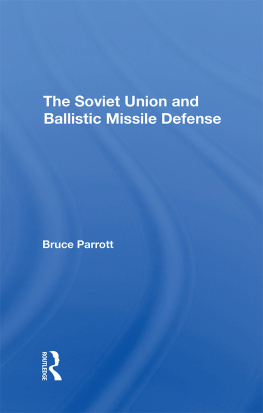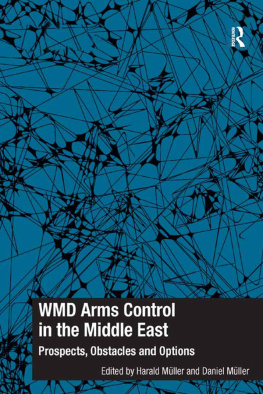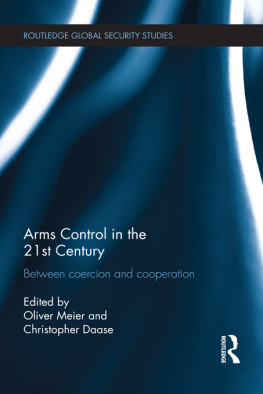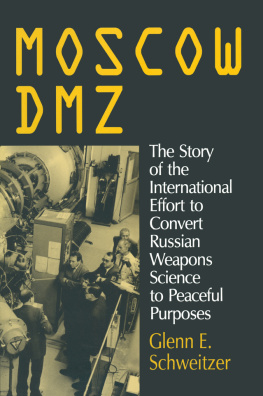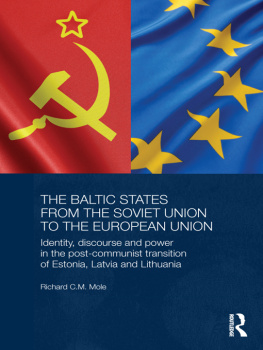More praise for Arms on the Market
The challenge of dismantling the weapons of the Cold War is firmly set forth and addressed in this volume edited by Gary Bertsch and Suzette Grillot. The flow of fissile material must be stopped at its source, and Arms on the Market lays the ground work to do just that.
Harold P. Smith, Jr., former Assistant to the Secretary of Defense, Department of Defense
As pioneers in research on export control issues, Gary Bertsch and his colleagues provide a very timely contribution to understanding the threats of weapons proliferation and global terrorism. Arms on the Market not only sounds an important warning about potential leakages of nuclear and other dangerous technologies from the former Soviet Union, but also highlights practical steps needed to contain the threats.
Glenn Schweitzer, Office Director, National Research Council
This book addresses one of the most serious threats to the national interests of the United Statesthe control of nuclear weapons-related material from the territories of the former Soviet Union. Written by a talented team of young analysts, Arms on the Market provides valuable and timely information for analysts and policymakers alike.
Graham T. Allison, Director, Belfer Center for Science and International Affairs, Harvard University
ARMS ON THE MARKET
REDUCING THE RISK OF PROLIFERATION
IN THE FORMER SOVIET UNION
EDITED BY
GARY K. BERTSCH AND SUZETTE R. GRILLOT
CENTER FOR INTERNATIONAL TRADE & SECURITY
THE UNIVERSITY OF GEORGIA
WITH A FOREWORD BY SAM NUNN
ROUTLEDGE
NEW YORK LONDON
Published in 1998 by
Routledge
29 West 35th Street
New York, NY 10001
Published in Great Britain by
Routledge
11 New Fetter Lane
London EC4P 4EE
Copyright 1998 by Routledge
Printed in the United States of America on arid-free paper.
All rights reserved. No part of this book may be reprinted or reproduced or utilized in any form or by any electronic, mechanical, or other means, now known or hereafter invented, including photocopying and recording, or in any information storage or retrieval system, without permission in writing from the publisher.
Library of Congress Cataloging-in-Publication Data
Arms on the market: Reducing the risk of proliferation in the former Soviet Union /
edited by Gary K. Bertsch and Suzette R. Grillot.
p. cm.
Includes bibliographical references (p ).
ISBN 0-415-92058-2 ISBN 0-415-92059-0
1. Nuclear industry Former Soviet republics. 2. Nuclear industry security measures Former Soviet republics. 3. Nuclear industry Former Soviet republics Safety measures. 4. Nuclear industry Safety measures International cooperation. 5. Nuclear nonproliferation.
I. Bertsch, Gary K. II. Grillot, Suzette R.
HD9698.F62A75 1998
10 9 8 7 6 5 4 3 2 1
CONTENTS
EXPLAINING THE DEVELOPMENT OF NONPROLIFERATION EXPORT CONTROLS
FRAMEWORK, THEORY, AND METHOD |
THE EVOLUTION OF THE UKRAINIAN EXPORT CONTROL SYSTEM
STATE BUILDING AND INTERNATIONAL COOPERATION |
UNDERSTANDING EXPORT CONTROLS IN BELARUS
THE POWER OF INDUCEMENTS |
A WORK IN PROGRESS
THE DEVELOPMENT OF EXPORT CONTROLS IN KAZAKHSTAN |
ESTONIA, LATVIA, AND LITHUANIA
WESTERN COUNTRIES EYEING MORE WESTERN INTEGRATION |
CENTRAL ASIA
THE ABSENCE OF INCENTIVES |
SECURITY DIMENSIONS OF NONPROLIFERATION
EXPORT CONTROL DEVELOPMENT IN THE CAUCASUS |
FSU EXPORT CONTROL DEVELOPMENT
THE FACTORS THAT MATTER |
LIST OF ACRONYMS
| AG | Australia Group |
| CFE | Conventional Forces in Europe Treaty |
| CIS | Commonwealth of Independent States |
| COCOM | Coordinating Committee for Multilateral Export Controls |
| CSCE | Conference on Security and Cooperation in Europe |
| CTR | Cooperative Threat Reduction (Nunn-Lugar) Program |
| CWC | Chemical Weapons Convention |
| DOE | U.S. Department of Energy |
| EBRD | European Bank for Reconstruction and Development |
| EU | European Union |
| FREEDOM | Freedom for Russia and the Emerging Eurasian Democracies and Open Markets |
| FSA | FREEDOM Support Act |
| FSU | Former Soviet Union |
| GDP | Gross Domestic Product |
| HEU | Highly Enriched Uranium |
| IAEA | International Atomic Energy Agency |
| ICBM | Inter-Continental Ballistic Missile |
| IC/DV | Import Certification and Delivery Verification |
| ITAR | International Traffic in Arms Regulations |
| MFA | Ministry of Foreign Affairs |
| MFER | Ministry of Foreign Economic Relations |
| MIC | Military Industrial Complex |
| MOD | Ministry of Defense |
| MOJ | Ministry of Justice |
| MOU | Memorandum of Understanding |
| MPC&A | Materials Protection, Control and Accounting |
| MTCR | Missile Technology Control Regime |
| NATO | North Atlantic Treaty Organization |
| NGO | Non-Governmental Organization |
| NIS | New Independent States |
| NNWS | Non-Nuclear Weapons State |
| NPT | Nuclear Nonproliferation Treaty |
| NSG | Nuclear Suppliers Group |
| SEED | Support for East European Democracy |
| SNM | Special Nuclear Materials |
| UN | United Nations |
| USSR | Union of Soviet Socialist Republics |
| WA | Wassenaar Arrangement |
| WEU | West European Union |
| WMD | Weapons of Mass Destruction |
FOREWORD
SAM NUNN
Today there is no greater threat to our nation or to the world than the illicit spread of weapons of mass destruction. During the Cold War our national security and that of the Soviet Union were premised upon a dangerous, but at least well-understood, balance of terror and upon well-traveled avenues of diplomacy.
Both the United States and the Soviet Union maintained formidable nuclear arsenals, so there was a high risk that conflict would result in certain and unacceptable losses no matter who the initial aggressor. If conflict appeared possible, diplomatic channels were available as a relief valve. Although living in a climate of high risk, we enjoyed a high degree of stability.
The collapse of Soviet communism and the end of the Cold War eliminated what many considered to be the greatest threat to world security. Certainly the threat of all-out war has gone down very significantly. Yet, today the concerns of the Cold War have been replaced with new and far different threats. We have moved from an era of high risks but also high stability to an era of much lower risk but also much lower stability.

